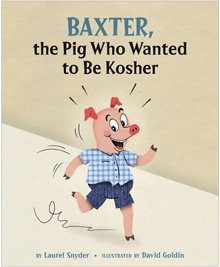
KIDS' BOOK Even children's literature raises questions about religious dietary restrictions. |
Rabbi Jared Saks, of Maine's largest Jewish congregation, no longer subscribes to his religion's most well-known taboo. An erstwhile vegetarian, Saks kept strictly kosher in Israel for his first year of rabbinical school. Then, upon moving back to New York, he read Eric Schlosser's Fast Food Nation, and everything changed. He could no longer stomach industrial (even if kosher) meat. At the time, Saks couldn't find any certified kosher, ethically raised beef."What really is at the core of kashrut is that G-d makes things holy by separating things," says Saks, of Congregation Bet Ha'am in South Portland. "So I don't say that I keep kosher, but for me there's still an essence of kashrut at play every time I sit down to a meal."
For Saks, and a growing number of progressive Jews, that means he only consumes meat from sustainable sources. This movement catalyzed after the 2008 immigration raid that revealed abhorrent labor practices at the largest US kosher meatpacking plant, in Postville, Iowa. Saks initially ate "kosher-style." But a locally sourced meat entrée became preferable to vegetables shipped in from overseas. Now, Saks will order that pork chop, if it's from a worthy source.
After all, pigs thrive here in Maine. They're more sustainable than cows, devouring all our scraps except coffee grinds and citrus peels. For many (including this reporter), kosher is more about whether the animal lived in a holy way than how it died. Our tribe takes our cues less from the Torah, and more from nature.
David Levi, who plans to open Vinland, a hyper-local restaurant in Portland, teaches cooking classes on everything from pork salumi to the Italian-Jewish cuisine of his heritage (he grew up around a lot of prosciutto). On his blog, he calls for embracing food that embodies the Jewish social-justice concept of tikkun olam (see davidscottlevi.blogspot.com/2011/10/my-kind-of-kosher.html).
Maina Handmaker would agree with that view. She loved pork as a child in Hong Kong, then went vegetarian in high school in Kentucky and for most of her time at Bowdoin College. Apprenticing as a student on Milkweed Farm in Brunswick, she experienced the magic of bacon raised on-site.
"As a Jew and just as a person, I feel more connected to the ethical principles of sustainable agriculture than I ever did to the isolated, ancient rules of kashrut," says Handmaker, who works for Six River Farm in Bowdoinham. "Following a law in the Torah is pretty esoteric in comparison to what I can watch on these farms and know and feel good about."
Previous generations of Jews in Maine first embraced lobster while still shunning pork. "Both lobster and pork are equally forbidden," says David Freidenreich, a Jewish studies professor at Colby College, who, despite keeping traditionally kosher, chose to live in Portland to be near the city's excellent restaurants. "Even when Jews abandoned other Jewish food practices, they would refrain from eating pork. At the same time, by eating lobster, Jews were affirming their identity as Mainers."